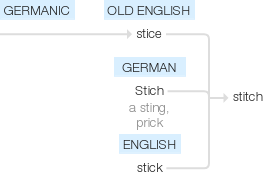Stitch
Old English stice ‘a puncture, stabbing pain’, of Germanic origin; related to German Stich ‘a sting, prick’, also to stick2. The sense ‘loop’ (in sewing etc.) arose in Middle English.
wiktionary
From Middle English stiche, from Old English stiċe(“a prick, puncture, stab, thrust with a pointed implement, pricking sensation, stitch, pain in the side, sting”), from Proto-West Germanic *stiki, from Proto-Germanic *stikiz(“prick, piercing, stitch”), from Proto-Indo-European *(s)teyg-(“to stab, pierce”).
Cognate with Dutch steek(“prick, stitch”), German Stich(“a prick, piercing, stitch”), Old English stician(“to stick, stab, pierce, prick”). More at stick.
From Middle English sticchen, stichen, from Old English *stiċċan, stiċċian, from Proto-Germanic *stikjaną(“to stab, stick, prick”), influenced by the noun (see above).
etymonline
stitch (n.)
Old English stice "a prick, puncture, sting, stab," from Proto-Germanic *stikiz (source also of Old Frisian steke, Old High German stih, German Stich "a pricking, prick, sting, stab"), from PIE *stig-i-, from root *steig- "to stick; pointed" (see stick (v.)). The sense of "sudden, stabbing pain in the side" was in late Old English.
Senses in sewing and shoemaking first recorded late 13c.; meaning "bit of clothing one is (or isn't) wearing" is from c. 1500. Meaning "a stroke of work" (of any kind) is attested from 1580s. Surgical sense first recorded 1520s. Sense of "amusing person or thing" is 1968, from notion of laughing so much one gets stitches of pain (compare verbal expression to have (someone) in stitches, 1935).
stitch (v.)
c. 1200, "to stab, pierce," also "to fasten or adorn with stitches;" see stitch (n.). Surgical sense is from 1570s. Related: Stitched; stitcher; stitching.
